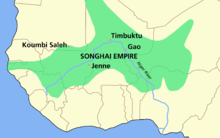
Back سلطنة صنغاي Arabic إيمبراطورية صونݣاي ARY Imperiu songhai AST Sonqay (dövlət) Azerbaijani سونغای ایمپراتورلوغو AZB Сангай (дзяржава) Byelorussian Сонгайско царство Bulgarian Songai Mansamara BM সোনহাই সাম্রাজ্য Bengali/Bangla Imperi Songhai Catalan
Zaghai (Songhai) Empire | |||||||||||||||
|---|---|---|---|---|---|---|---|---|---|---|---|---|---|---|---|
| c. 1430s–1591 | |||||||||||||||
 Territory of the Songhai Empire | |||||||||||||||
| Capital | Gao[1] | ||||||||||||||
| Common languages | |||||||||||||||
| Religion | |||||||||||||||
| (Emperor) | |||||||||||||||
• 1464–1492 | Sunni Ali | ||||||||||||||
• 1492–1493 | Sonni Bāru | ||||||||||||||
• 1493–1528 | Askia the Great | ||||||||||||||
• 1529–1531 | Askia Musa | ||||||||||||||
• 1531–1537 | Askia Benkan | ||||||||||||||
• 1537–1539 | Askia Isma'il | ||||||||||||||
• 1539–1549 | Askia Ishaq I | ||||||||||||||
• 1549–1582/1583 | Askia Daoud | ||||||||||||||
• 1588–1592 | Askia Ishaq II | ||||||||||||||
| Historical era | Early Modern Era | ||||||||||||||
• Songhai state emerges at Gao | c. 1000 | ||||||||||||||
• Independence from Mali Empire | c. 1430s | ||||||||||||||
• Sonni dynasty begins | 1468 | ||||||||||||||
• Askiya dynasty begins | 1493 | ||||||||||||||
| 1591 | |||||||||||||||
• The Nobles moved south to present-day Niger and formed various smaller kingdoms | 1591 | ||||||||||||||
• French depose last Askia of the Dendi | 1901 | ||||||||||||||
| Area | |||||||||||||||
| 1550[2] | 800,000 km2 (310,000 sq mi) | ||||||||||||||
| Currency |
| ||||||||||||||
| |||||||||||||||
The Songhai Empire was a state located in the western part of the Sahel during the 15th and 16th centuries. At its peak, it was one of the largest African empires in history. The state is known by its historiographical name, derived from its largest ethnic group and ruling elite, the Songhai people. Sonni Ali established Gao as the empire's capital, although a Songhai state had existed in and around Gao since the 11th century. Other important cities in the kingdom were Timbuktu and Djenné, where urban-centred trade flourished; they were conquered in 1468 and 1475, respectively. Initially, the Songhai Empire was ruled by the Sonni dynasty (c. 1464–1493), but it was later replaced by the Askia dynasty (1493–1591).
During the second half of the 13th century, Gao and the surrounding region had grown into an important trading centre and attracted the interest of the expanding Mali Empire. Mali conquered Gao near the end of the 13th century. Gao remained under Malian command until the late 14th century. As the Mali Empire started disintegrating, the Songhai reasserted control of Gao. Songhai rulers subsequently took advantage of the weakened Mali Empire to expand Songhai rule.
Under the rule of Sonni Ali, the Songhai surpassed the Malian Empire in area, wealth, and power, absorbing vast regions of the Mali Empire. His son and successor, Sonni Bāru, was overthrown by Muhammad Ture, one of his father's generals. Ture, more commonly known as Askia the Great, instituted political and economic reforms throughout the empire.
A series of plots and coups by Askia's successors forced the empire into a period of decline and instability. Askia's relatives attempted to govern the kingdom, but political chaos and several civil wars within the empire ensured the empire's continued decline, particularly during the rule of Askia Ishaq I. The empire experienced a period of stability and a string of military successes during the reign of Askia Daoud.
Askia Ishaq II, the last ruler of the Songhai Empire, ascended to power in a long dynastic struggle following the death of Daoud. In 1590, Al-Mansur took advantage of the recent civil conflict in the empire and sent an army under the command of Judar Pasha to conquer the Songhai and gain control of the trans-Saharan trade routes. The Songhai Empire collapsed after the defeat at the Battle of Tondibi in 1591.

circa 1500.
- ^ Bethwell A. Ogot, Africa from the Sixteenth to the Eighteenth Century, (UNESCO Publishing, 2000), 303.
- ^ Taagepera 1979, pp. 497.
© MMXXIII Rich X Search. We shall prevail. All rights reserved. Rich X Search